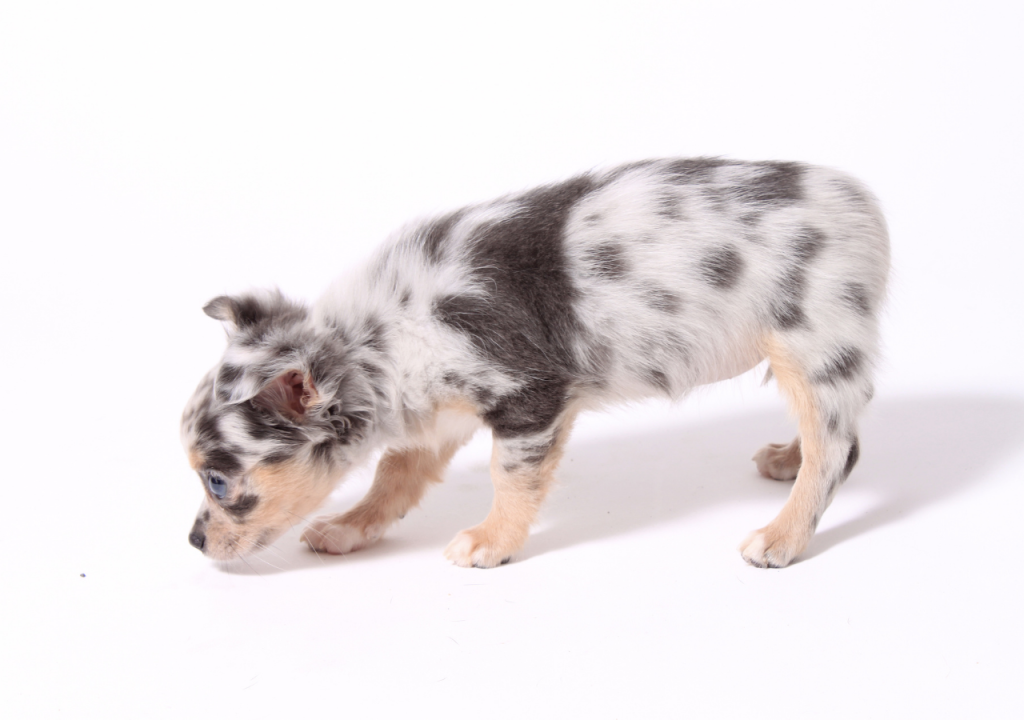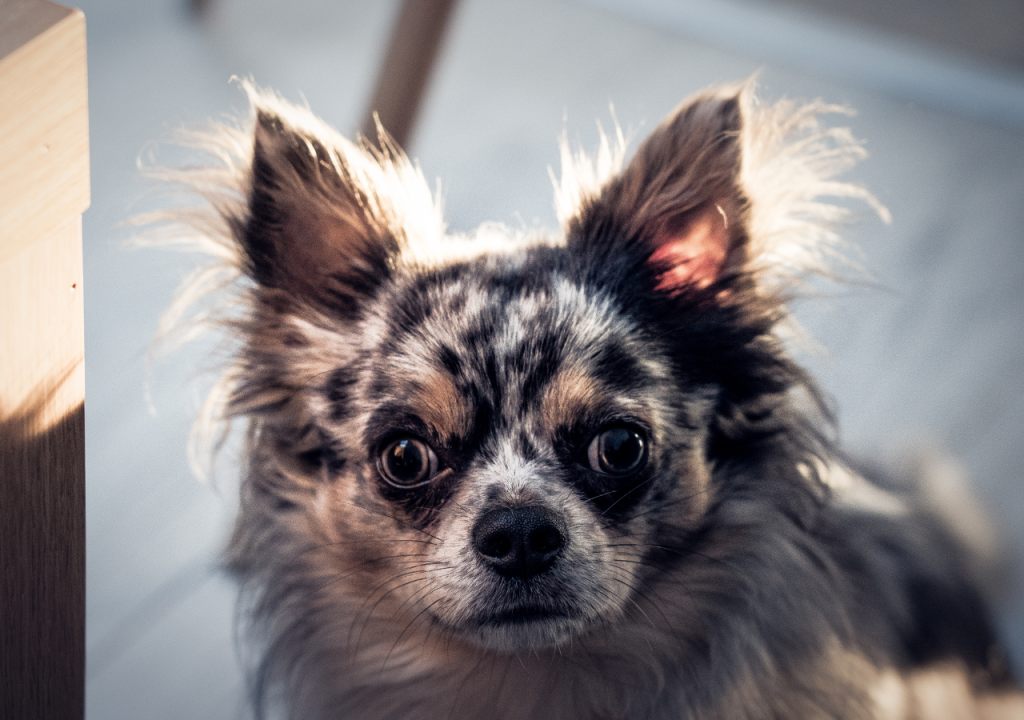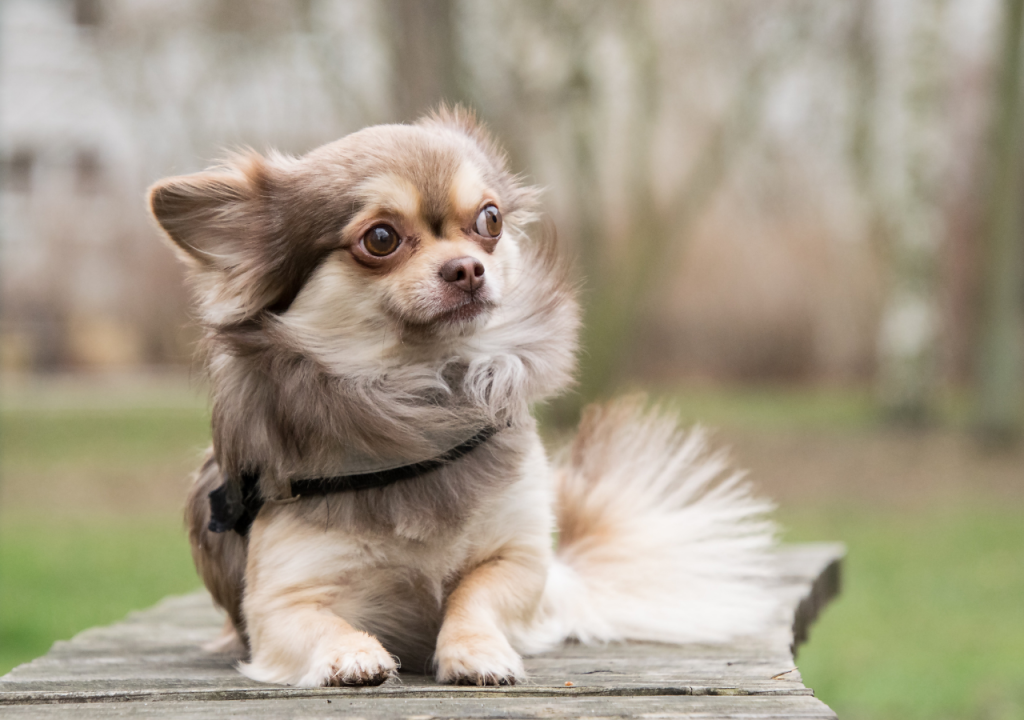Merle Chihuahuas are a fascinating and eye-catching variety of the beloved Chihuahua breed. With their unique coat patterns and charming personalities, they are a popular choice among dog enthusiasts. Besides they look so unique, these Chis are often higher in price than standard colors. This comprehensive guide will cover everything you need to know about Merle Chihuahuas, from their origins and characteristics to care tips and costs.

What is a Merle Chihuahua?
A Merle Chihuahua is a Chihuahua that has a distinct coat pattern known as “merle.” This pattern is characterized by patches of diluted color mixed with the dog’s base coat color. The result is a striking and often mottled appearance that sets Merle Chihuahuas apart from their solid-colored counterparts.
Are Merle Chihuahuas Rare?
Yes, Merle Chihuahuas are rare compared to other Chihuahua coat patterns. The merle gene is not naturally found in Chihuahuas, so careful and selective breeding practices are necessary to produce these unique dogs. Due to their rarity, Merle Chihuahuas can be more expensive and sought after by collectors and breeders. However, just like any other exotic or rare coat color, breeder should pay a special attention when breeding merle Chis. Namely, this rare Chis are on a higher tendency to suffer from deafness, and different skin conditions.
Merle Chihuahuas will be more prone to allergies and their skin can react more sensitively when spending time in the sun. So, in case you’re an owner of a short haired Merle Chihuahua, make sure you protect their bodies with the right clothing.
What Gene Combination Makes a Merle Chihuahua?
The merle coat pattern in Chihuahuas results from a specific gene combination involving the merle (M) allele. The merle gene is a dominant gene that causes a mottled or patchy appearance in the coat, resulting from the dilution of certain pigment cells. This gene is not naturally present in the Chihuahua breed and must be introduced through careful breeding.

When a Chihuahua inherits one merle allele (M) from one parent and a non-merle allele (m) from the other, the dog will display the merle pattern (Mm). It’s crucial to note that breeding two merle Chihuahuas together (MM) can lead to severe health issues, including deafness and vision problems, due to the double dose of the merle gene.
Responsible breeders avoid this combination to prevent such genetic complications. Thus, a single merle gene combined with a non-merle gene creates the striking and desirable merle coat in Chihuahuas while minimizing the risk of health problems associated with the merle gene. Genetic testing and careful breeding practices are essential to produce healthy Merle Chihuahuas with their distinctive and beautiful coat patterns.
READ ALSO: How To Deal With Chihuahua Shedding? Expert Tips
Merle Chihuahua Colors
Merle Chihuahua colors can vary widely, adding to their uniqueness. The most common base colors include:
- Blue Merle Chihuahua: This is one of the most popular color variations, featuring a blue-gray base coat with darker blue or black patches.
- Chocolate Merle: A rich brown base coat with lighter and darker patches of chocolate color.
- Red Merle: A reddish base coat with various shades of red and lighter patches.
- Lilac Merle: A rare and beautiful variation with a lavender or light purple base coat mixed with darker patches.
These colors can be mixed and matched in countless ways, making each Merle Chihuahua truly one of a kind.
Characteristics of Merle Chihuahuas
Merle Chihuahuas share many traits with standard Chihuahuas, but their unique coat patterns come with specific considerations.
Appearance
Aside from their merle coat, Merle Chihuahuas have the same physical characteristics as other Chihuahuas. They are small, typically weighing between 2 to 6 pounds, with large, expressive eyes and ears. The merle pattern can appear in both short-haired and long haired Merle Chihuahuas.
Temperament
Merle Chihuahuas are known for their lively and affectionate personalities. They are loyal companions and enjoy spending time with their owners. Despite their small size, they can be quite courageous and are often described as having a “big dog” attitude.
Health Considerations
The merle gene can sometimes be associated with health issues, such as hearing and vision problems. Responsible breeders take care to avoid breeding two merle dogs together, as this can increase the risk of these issues. Regular veterinary check-ups are essential to ensure the health and well-being of your Merle Chihuahua.

How Much Does a Merle Chihuahua Cost?
Due to their rarity and unique appearance, how much does a Merle Chihuahua cost can vary significantly. On average, you can expect to pay between $1,500 and $3,000 for a Merle Chihuahua. However, prices can go higher depending on factors such as pedigree, breeder reputation, and specific color patterns.
Caring for a Merle Chihuahua
Taking care of a Merle Chihuahua involves the same basic principles as caring for any other Chihuahua, with a few additional considerations due to their unique coat and potential health issues.
Diet and Nutrition
A well-balanced diet is crucial for keeping your Merle Chihuahua healthy. Choose high-quality dog food that is appropriate for their size and age. Avoid overfeeding, as Chihuahuas are prone to obesity, which can lead to other health problems.
Exercise and Activity
Despite their small size, Merle Chihuahuas need regular exercise to stay fit and happy. Daily walks, playtime, and mental stimulation are essential. They enjoy activities like playing fetch, agility training, and interactive toys.
Grooming
Grooming needs will vary depending on whether you have a short-haired or long haired Merle Chihuahua. Short-haired Merle Chihuahuas require minimal grooming, while long-haired varieties will need regular brushing to prevent matting and tangles. Regular baths, nail trimming, and dental care are also important.
As one of the best brushes for Chihuahuas, we recommend you check our Chihuahua Bliss Grooming Brush. It features gentle pins that effectively collect the dog’s dead hair.

Health Check-ups
Regular veterinary check-ups are vital to monitor your Merle Chihuahua’s health. Pay special attention to their hearing and vision, as merle-coated dogs can be more susceptible to related issues. Vaccinations, parasite prevention, and dental cleanings should be part of their routine care.
Are Merle Chihuahuas Purebred?
One common question is whether are Merle Chihuahuas purebred. The answer is yes, Merle Chihuahuas can be purebred. However, because the merle gene is not naturally found in the Chihuahua breed, introducing it requires careful breeding practices. Responsible breeders use genetic testing to ensure the health and integrity of their breeding programs.
Choosing a Merle Chihuahua Breeder
When looking to add a Merle Chihuahua to your family, it’s essential to choose a reputable breeder. Here are some tips to help you find a responsible breeder:
- Research: Look for breeders with a good reputation and positive reviews from previous customers.
- Visit: If possible, visit the breeder’s facility to see the conditions in which the dogs are raised.
- Ask Questions: Inquire about the breeder’s practices, including health testing, breeding history, and socialization of the puppies.
- Health Guarantees: A reputable breeder should provide health guarantees and be transparent about any potential health issues in the breed.
Avoid purchasing from puppy mills or pet stores, as these sources often prioritize profit over the health and well-being of the dogs.
The Joy of Owning a Merle Chihuahua
Owning a Merle Chihuahua can be a rewarding experience. These tiny dogs bring a lot of love, personality, and joy into their owners’ lives. Their unique appearance and spirited temperament make them a favorite among dog enthusiasts.
Building a Bond
Merle Chihuahuas are known for their devotion and loving nature, forming deep connections with their owners. They flourish in environments where they receive plenty of attention and truly enjoy being integral members of the family. Early training and socialization are key to helping these dogs grow into well-mannered and self-assured adults.
Socialization
Early socialization is crucial for Merle Chihuahuas. Expose them to various people, places, and experiences to help them become well-rounded dogs. Puppy classes and playdates with other dogs can be beneficial.
Training
Chihuahuas, including Merle Chihuahuas, are intelligent and eager to please, making them relatively easy to train. Use positive reinforcement techniques, such as treats and praise, to encourage good behavior. Consistency and patience are key to successful training.
Possible Health Problems in Merle Chihuahuas
Merle Chihuahuas, while visually striking, can be prone to certain health issues due to the merle gene. Here are some of the potential health problems that may affect Merle Chihuahuas:
1. Hearing Problems
One of the most common issues associated with the merle gene is hearing impairment. Merle Chihuahuas can be born partially or completely deaf, particularly if they inherit two merle genes (MM). The merle pattern affects the pigment cells in the inner ear, which are crucial for normal hearing function.
2. Vision Issues
The merle gene can also impact vision, leading to conditions such as microphthalmia (abnormally small eyes), colobomas (defects in the eye structure), and increased sensitivity to light. These issues are more prevalent in double merles but can also occur in single merles (Mm).
3. Skin Sensitivity
Merle Chihuahuas may have more sensitive skin compared to non-merle Chihuahuas. The areas of their coat with less pigmentation can be more prone to sunburn and other skin conditions, requiring extra care and protection from the sun.
4. Increased Risk of Genetic Disorders
The breeding practices used to produce Merle Chihuahuas can sometimes result in a higher incidence of other genetic disorders. It is essential for breeders to conduct thorough genetic testing to avoid passing on hereditary diseases.
5. Neurological Problems
In some cases, Merle Chihuahuas may experience neurological issues. This is again more likely in dogs with two merle genes but can occur in those with a single merle gene as well. These issues can manifest as balance problems, seizures, or developmental delays.
Living With a Merle Chihuahua: Conclusion
Merle Chihuahuas are a unique and captivating variation of the Chihuahua breed. With their distinctive coat patterns and charming personalities, they make wonderful companions. Whether you’re drawn to the stunning blue Merle Chihuahua or the striking long haired Merle Chihuahua, there’s no denying the appeal of these rare and beautiful dogs.
When considering adding a Merle Chihuahua to your family, be prepared for the commitment of caring for their health and well-being. Choose a reputable breeder, provide them with proper nutrition, exercise, and grooming, and enjoy the joy and companionship they bring into your life. With their loyal and loving nature, Merle Chihuahuas are sure to become cherished members of your family.

